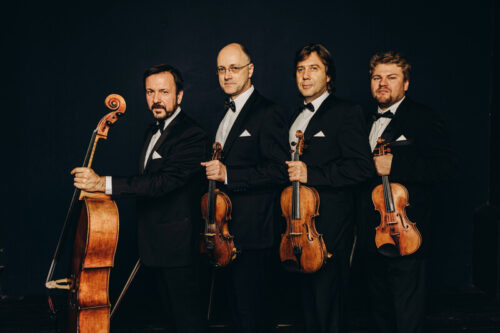 United Kingdom Brahms and Tchaikovsky: Borodin String Quartet (Nikolai Sachenko [violin], Sergei Lomovsky [violin], Igor Naidin [viola], Vladimir Balshin [cello]). Queen Elizabeth Hall, London, 12.1.2025. (CSa)
United Kingdom Brahms and Tchaikovsky: Borodin String Quartet (Nikolai Sachenko [violin], Sergei Lomovsky [violin], Igor Naidin [viola], Vladimir Balshin [cello]). Queen Elizabeth Hall, London, 12.1.2025. (CSa)

Brahms – String Quartet in A minor, Op.51 No.2
Tchaikovsky – String Quartet No.2 in F, Op.22
In 1945 four students from the Moscow Conservatory, all deeply committed to their Russian musical heritage, established a chamber group eventually named after the Russian composer and chemist Alexander Borodin. Despite Stalin’s widespread cultural purges and ruthless repression, the Borodins became the first Soviet chamber group permitted to travel and to be heard in the West. By the time the group made its first appearance in London in October 1969, at the newly constructed Queen Elizabeth Hall, it had already established its legendary reputation for musical perfection. While individual players have changed over the years, the quartet’s status as one of the greatest in the world remains unchallenged. ‘The ensemble is to chamber music’ claimed one admirer ‘what Richter is to the piano, Oistrakh to the violin and Rostropovich to the cello.’
80 years on, and almost a decade since its last London appearance, the Borodin Quartet made a welcome return to the hall in a richly romantic but seldomly performed programme of Brahms and Tchaikovsky. Dressed in black and unsmiling, the musicians solemnly took their seats in front of a stark black curtain on the chiaroscuro-lit stage. If this was to be a celebratory four-score birthday bash, there was no facial hint of the wistful pleasures about to unfold.
From the first, restlessly searching bars of the opening Allegro of Brahms’s String Quartet in A minor, the Borodins demonstrated their technical precision and subtle interpretative skills. Remarkably, without sharing so much as a nod or glance towards each other, they played with complete cohesion.
Buried cryptically in the work’s opening motif are the notes – F-A-E – standing for ‘frei aber einsam’ (‘free, but alone’), an allusion by Brahms to the personal motto of his friend, the great violinist Joseph Joachim The phrase encapsulated Joachim’s belief that true artistic freedom requires independence, even at the cost of solitude. In some performances, Brahms’s lush lyricism can become sickly sweet, but not in this performance. The Borodins brought muscularity and crispness to the cross-rhythms and jagged accents of the Allegro. The gently ‘rocking’ accompaniment of Igor Naidin’s viola in the central section gently steered a genial but unsentimental conversation with the other instruments, before joining them in a swelling and turbulent coda. A serenely beautiful second movement Andante flecked with moments of passion, was followed by a ghostly minuet interwoven with Nikolai Sachenko’s haunting violin obligato. A wild Finale, filled with Hungarian folk rhythms, building to a whirlwind dance brought the first half of the concert to an exuberant close.
Tchaikovsky was not a fan of Brahms’s music, which he found overly academic and lacking in emotional depth. ‘What an ungifted soul. Compared to Brahms Mendelssohn is a giant’ he once wrote. For his part, Brahms generally had a low regard for composers who were highly emotional and expressive. It would be interesting to know then what Brahms would have made of the work which occupied the second half of the concert: Tchaikovsky’s rarely played second String Quartet in F. The uncharacteristic dissonance of the melancholy Adagio introduction, which leads to an almost operatic Moderato assai was given a highly charged and emotional reading, and the second movement Scherzo unashamedly plumbed the depths of Tchaikovsky’s emotional anguish. After a plaintive Andante played with searing beauty, came a surging, almost manic Finale, filled with fragments of gorgeous melody, a complex fugue and an exultant coda brilliantly coordinated and executed with breathtaking speed. Brahms may have disapproved of Tchaikovsky’s heart-on-sleeve fervour and may have expressed reservations about the intensity of the performance, but the audience loved it. Loud calls for an encore were rewarded with a beguiling rendition of the Romance from Rachmaninov’s String Quartet No.1 and brought a welcome if belated smile to the faces of these exceptional players.
Chris Sallon
